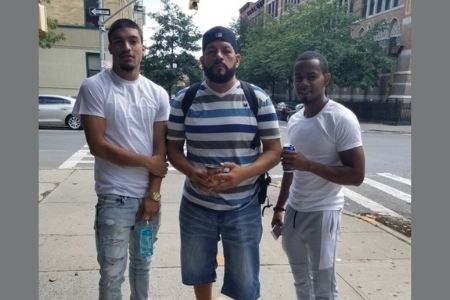Nelson Valentine -- Local Hero, Big Heart

Avenues for Justice’s (AFJ)'s Senior Court Advocate, Nelson Valentine, grew up on the Lower East Side when it was rampant with poverty, crime, and abandoned buildings. At a young age, he knew he needed help to survive. As a teenager he played basketball with an NYU student living in the neighborhood, Robert Siegel. Robert launched the initial framework for AFJ, volunteering as an advocate for youth in the court system, and began mentoring Nelson. Nelson also met AFJ’s Co-founder Angel Rodriguez who was working at the local Boys’ Club, where staff helped Nelson land his first job working in accounts receivable.
That job launched Nelson into a good career as a bookkeeper. But he knew his success was due not only to his own hard work, but also to Angel and Robert’s support. “They never closed the door on me. I knew I wanted to follow them and do this kind of work,” Nelson recalls.
In 1989, Nelson bumped into Angel on the street. Robert had passed away and Angel had launched AFJ – known then as the Andrew Glover Youth Program - as one of the first Alternative to Incarceration programs for youth in the country.
Angel hired Nelson on the spot and for a period, the two were the entire staff, each working 15-hour days, advocating for youthful offenders from an office inside the Manhattan Criminal court house and running a center on the Lower East Side, called The Robert Siegel Center. While AFJ has since grown, both still put in long hours to help our youth.
Some of Nelson’s observations and favorite moments at Avenues for Justice over the years are:
On Robert Siegel: Growing up, my friends and I didn’t have enough to eat so Robert gave us meal tickets for New York University’s cafeteria and showed us the campus. It was my first real look at life outside of my neighborhood. I wanted to do the same for others.
Changes in the Lower East Side: We need more neighborhood coordination officers (NCO’s) because they understand the local community, and right now, drugs are everywhere like in the 1970s and 80s. I reach out to the rookies at the precinct so they know what we’re trying to achieve at Avenues for Justice - safer neighborhoods for our youth and for our City.
What we tell the parents: We work with the parents and guardians to be stronger with their children. The children are telling the parents what to do. We coach parents and guardians on how to set rules and boundaries.
Local youth - then and now: When I started at AFJ, the poverty was so intense, kids didn’t care if they went to jail. At the same time they lived simply and respected their parents - there were no $200 sneakers then. Today I have to tell our kids that Rap music is just giving a picture of what the musician has been through - it’s not giving them a ticket to copy them and go to jail.
Taking a youth from addiction to success: There was a young man in my building who was always high and selling drugs. I found out he was born addicted and in his teens was doing ten bags of heroin a day. But he wanted to change. I got him into a long-term rehab upstate and mentored him through treatment and high school. Today he’s a successful businessman - without our intervention, I’m not sure he’d be alive.
From arrest to being an AFJ court advocate: One of my favorite clients through the years is Elsie. She was arrested while pregnant and wanted to change. I worked with her intensively so that the court let her continue with AFJ instead of going to jail. When Elsie had her baby, Angel and I bought her a crib and delivered it to her home. Today she’s a college graduate and one of AFJ’s staff Court Advocates.
Caring is what counts: The idea that people still care - that’s what counts. At Avenues for Justice, we care for these young people because we were there ourselves and we’re not going to give up on them.


